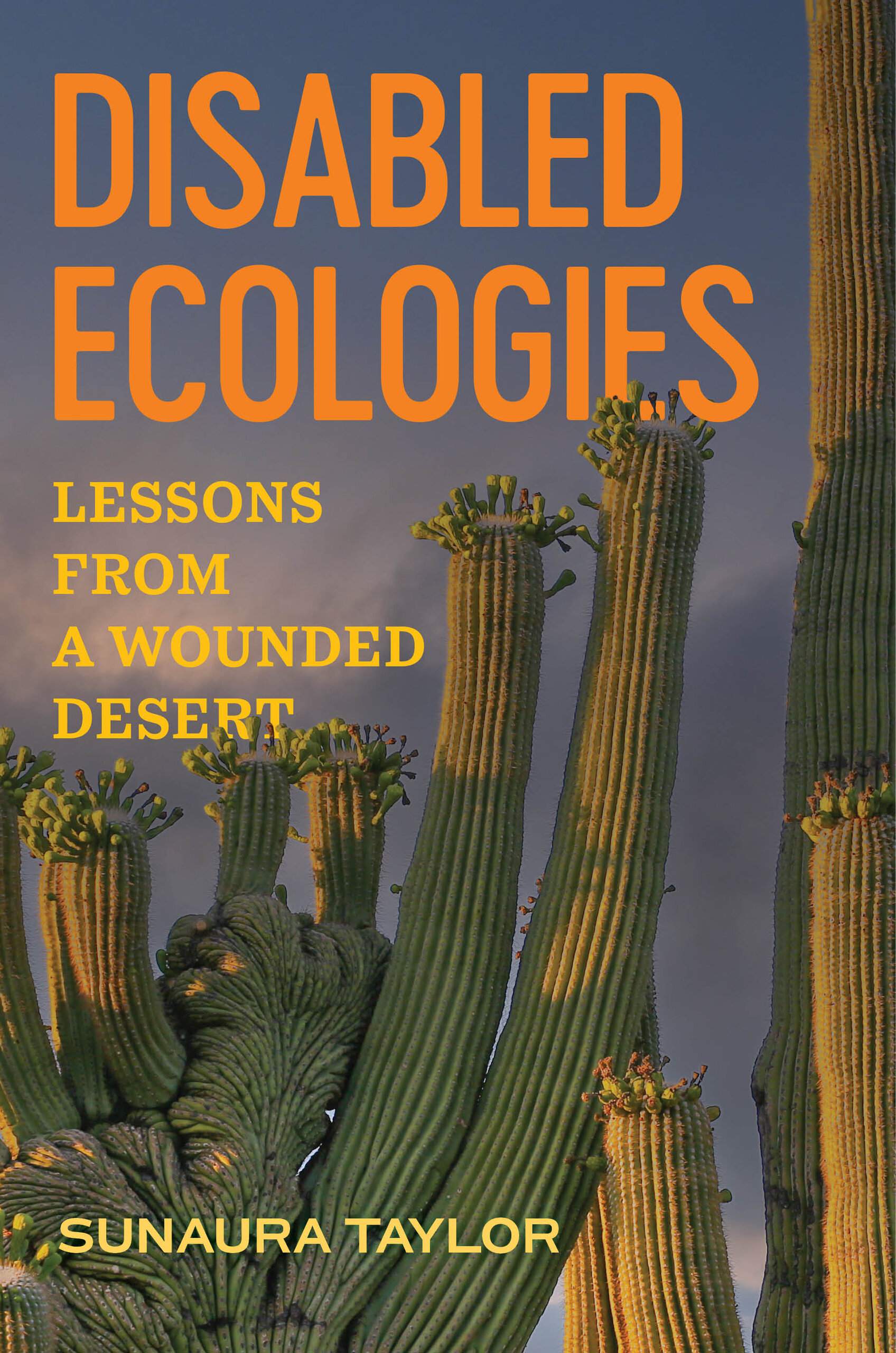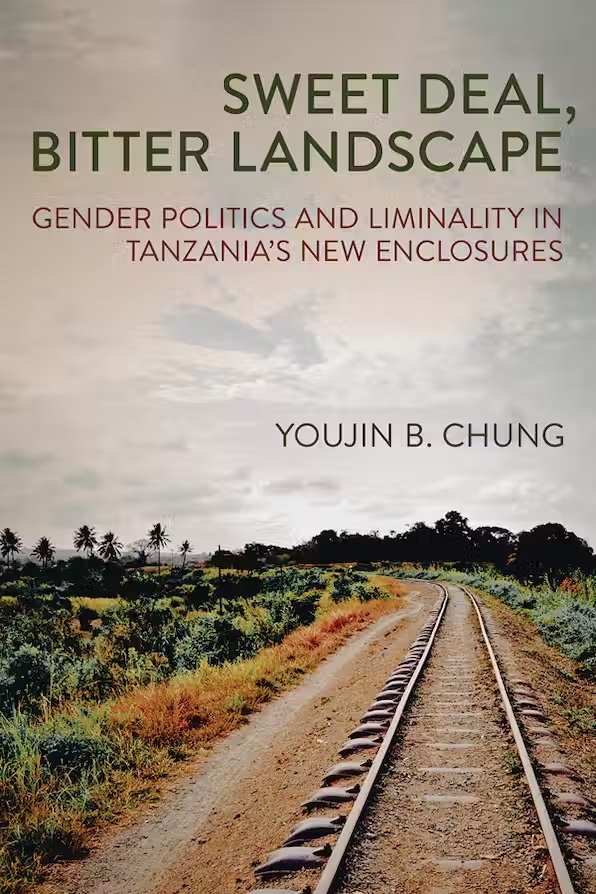This spring, professors Sunaura Taylor, Youjin Chung, and Michael Mascarenhas—all faculty in the Department of Environmental Science, Policy, and Management—each published new books examining environmental issues and social movements in the United States and overseas.
In late February, the authors joined Professor Rachel Morello-Frosch to discuss their findings and book writing process. Listen to their full conversation in the video below.
Disabled Ecologies: Lessons from a Wounded Desert
University of California Press
Sunaura Taylor

Within Disabled Ecologies, Taylor argues that disability is an integral concept to consider within environmental disciplines and movements. According to Taylor, critical disability studies have previously shown that disability and related concepts like health and illness are malleable and powerful concepts that are often depoliticized. “But disability is not just a biological or medical issue,” she said. “It’s actually a social, political, and relational phenomenon.”
To explore the concept, Taylor follows the “disabled ecology” that emerged from the Tucson International Airport Area (TIAA), a forty-year-old Superfund site created to remediate the long-term ecological damage caused by Hughes Aircraft Company (now RTX). The groundwater contamination sickened thousands of Southside Tucson’s largely Mexican-American population, injured the natural ecosystems, and drastically altered the region’s fragile aquifer.
As a former resident of the Tucson region, Taylor is familiar with the history and narrative surrounding the site. She follows the trails of disability that are created when ecosystems are contaminated, depleted, and profoundly altered to explore new and generative understandings of disability and nature.
In doing this, Taylor reveals the centrality of disability to systems of environmental violence and points out alternative ways of responding to ecological damage. “While focusing on disability, the book builds from many interventions in feminist ecologies, Black ecologies, and queer ecologies to show that social formation and systems of power are central to how we think about the environment, what we think of as the environment, and our relationships with the environment,” she said.
Sweet Deal, Bitter Landscape: Gender Politics and Liminality in Tanzania's New Enclosures
Cornell University Press
Youjin Chung

In Sweet Deal, Bitter Landscape, Chung traces the lived experiences of diverse groups of rural women and men as they struggled for survival and meaning after the Tanzanian government transferred more than 20,400 hectares of long-settled coastal land in the mid-2000s to a foreign investor seeking to establish a sugarcane plantation. The project was abruptly abandoned after ten years of negotiations, despite its backing by top government officials and promises of financial support from international development agencies.
“Many government officials, donors, journalists, and observers described the deal as having ended or failed with no immediate or long-term consequences,” Chung said. “Rather than characterizing land deals like this that did not go the way project planners had intended as failures, my book examines the deep, profound inequity and uncertainty of being in limbo, as people await development and dispossession yet to come.”
Despite the project’s ostensible failure, those who lived in the region faced what Chung described as an “increasingly militarized, masculinized, and repressive landscape.” She spoke to individuals and families who had to rethink and negotiate their everyday survival strategies after they had their crops uprooted, houses burned down, farm tools stolen, and confrontations with paramilitary groups intensified.
“People compared living in the shadow of this project to living with one foot in and one foot out,” she said. “It was like living in parentheses, or a cage, or like refugees on their own land and in their own nation.”
Toxic Water, Toxic System: Environmental Racism and Michigan's Water War
University of California Press
Michael Mascarenhas

Mascarenhas’ new book, Toxic Water, Toxic System, amplifies the voices of marginalized communities—particularly African American women, whose perspectives and labor have been consistently overlooked—in this examination of the Flint, Michigan water crisis and water shutoffs in Detroit. “What was being constructed in the media mostly was a narrative that this was a technical problem—that people were asleep at the switch and didn’t treat the river water,” he said. “For me, as a sociologist, that didn’t sound right.”
The book paints a portrait of a seemingly anonymous authoritarian state willing to maintain white supremacy at any cost—including poisoning an entire city and shutting off water to thousands of people. Mascarenhas specifically highlights Michigan Governor Rick Snyder’s use of a controversial state law that allowed him to wrestle legal authority from leaders of both cash-strapped cities and appoint an emergency manager. These managers used their power to cut collective bargaining agreements, pensions, and jobs while raising utility rates in an attempt to close budget gaps.
“At the time, Michigan had a 14 percent African American population, but 80 percent of all African Americans lived under emergency managers,” Mascarenhas said. “During the same period, only 3 percent of white residents had.”
In Flint, the emergency manager Snyder appointed exposed roughly 100,000 residents to elevated lead levels when he changed the city’s water source in a bid to cut down their budget deficit. In Detroit, the emergency manager drew international attention when he ordered water shutoffs—which peaked at roughly 3,000 a week at the height of summer—for households that were behind on payments. By weaving together three years of fieldwork, interviews with frontline activists, and archival data, Mascarenhas exposes how political alliances and bureaucratic mechanisms profoundly and disproportionately impacted the lives of Black residents.
Watch the recording of the event below.
